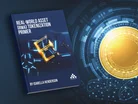Amberdata: RWA tokenisation gains significant momentum

With 72% of global finance professionals expected to explore tokenisation to drive innovation by 2026 according to Ripple Survey 2023, real-world asset (RWA) tokenisation has gained significant momentum over the past few years.
Estimated by BCG to be worth US$16tn by 2030, the rise in popularity – notes Amberdata – can be attributed to the growth of DeFi protocols and the burgeoning interest from financial institutions and governments in bringing financial instruments on-chain.
What is RWA Tokenisation?
Harnessing tokenisation and blockchain technology, virtual counterparts of physical assets can be created, converting rights to assets into digital tokens. These tokens can then be securely and reliability brought, sold and traded increasing liquidity and lowering both costs and transaction times across markets.
Poised to drive greater efficiency, accessibility and transparency across the global financial markets, the digitalisation of assets introduces an immutable and transparent record, with blockchain providing a secure means to verify ownership sales and transfers.
The representation of assets as a digital token details specific properties including measurements, expiration date, underlying price, entitlement, reserves, physical and transfer conditions and rights.
Amberdata explains that tokenised assets can take two primary forms:
- Off-chain – representing ownership of a physical asset
- On-chain – a native token, solely existing within the digital realm.
“This distinction allows for a flexible and diverse range of tokenised asset structures,” says Isabella Henderson, Senior Product Marketing Manager at Amberdata (Real-World Asset (RWA) Tokenization Primer).
“From real estate to art, commodities and intellectual property, RWA tokenisation is unlocking previously inaccessible markets, democratising investment opportunities and fostering greater liquidity and efficiency.”
The technology behind the solution
RWA tokenisation Infrastructure refers to the underlying framework that supports the tokenisation and management of assets. The infrastructure includes:
- Blockchain technology
- Smart contracts
- Legal and regulatory frameworks
- Security and identification
- Blockchain network data
- Oracles
With this infrastructure in place, participants can identify and value the asset(s), establish legal agreements which can be encoded into self-executing smart contracts to ensure compliance and distribute them to investors and participants who can trade them on secondary markets. Ongoing management of the tokenised assets is often facilitated through blockchain-based governance mechanisms.
“This paradigm shift is not only reshaping traditional investment practices but also paving the way for innovative financial products and services that were once unimaginable,” says Isabella. "Amberdata is pioneering efforts to provide market participants with the tools they need to navigate the complexities of RWA tokenisation."
Fungible and non-fungible tokens
The use of tokenised RWAs can be divided into two main categories – fungible and non-fungible tokens.
Fungible tokens
Usually used for transactions, fungible tokens are powered by Ethereum token standards like ERC-20 and encompass assets such as stablecoins, commodities, treasuries and bonds.
Non-fungible tokens
Smart contracts powered by Ethereum token standard ERC-721, non-fungible tokens represent unique assets that are not readily interchangeable with other tokens. They include assets such as art, collectables, real estate, intellectual property, royalties and luxury assets.
The benefits of RWA Tokenisation
Leading organisations such as European Investment Bank (EIB), Franklin Templeton, KKR, J.P. Morgan, Siemens, The Bank of Korea, Crédit Agricole CIB, Swedish Bank SEB and government bodies are investing in RWA tokenisation, seeing the potential that the solution holds.
Creating opportunities for both asset managers and investors, those participating can benefit from:
- Increased efficiency during transactions with the use of blockchain technology
- Greater liquidity to traditionally illiquid assets
- Lower costs across the investment process, cutting out the middle-man costs
- Increased transparency with a single source of truth
- New financial products previously not possible with traditional markets.
“While RWA tokenisation has yet to be fully integrated into financial markets, market cap and utilisation projections suggest significant growth potential and indicate that a profound shift in traditional investment practices is underway,” says Isabella.
“As we look ahead, the continued integration of digital asset data into RWA infrastructure will be essential for driving sustainable growth, mitigating risks and unlocking the full potential of tokenised assets.”
To find out more about RWA Tokenisation and the services that Amberdata can provide, click here.
Amberdata sponsors FinTech LIVE Singapore and Dubai
Connecting the world’s leading executives and organisations from Asia, the Middle East and Africa, FinTech LIVE returns in 2024 with two back-to-back events – FinTech LIVE Singapore and FinTech LIVE Dubai.
Want to become a sponsor of FinTech LIVE too?
Showcase your latest innovations and insights with the fintech and insurtech community by making an impact in front of fellow groundbreakers, decision-makers and influencers. As a sponsor, you can engage with an active audience through our branded opportunities, workshops and speaker experiences and drive the conversation forward.
******
Make sure you check out the latest edition of FinTech Magazine and also sign up to our global conference series – FinTech LIVE 2024
******
FinTech Magazine is a BizClik brand
- FinTech LIVE Singapore: AI in FinTech PanelFinancial Services (FinServ)
- FinTech LIVE Singapore: The Future of Digital Banking PanelFinancial Services (FinServ)
- Why Should You Attend FinTech LIVE Singapore?Financial Services (FinServ)
- FinTech LIVE Event Calendar 2025Financial Services (FinServ)


